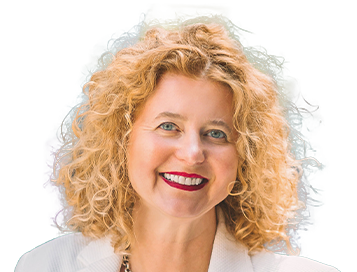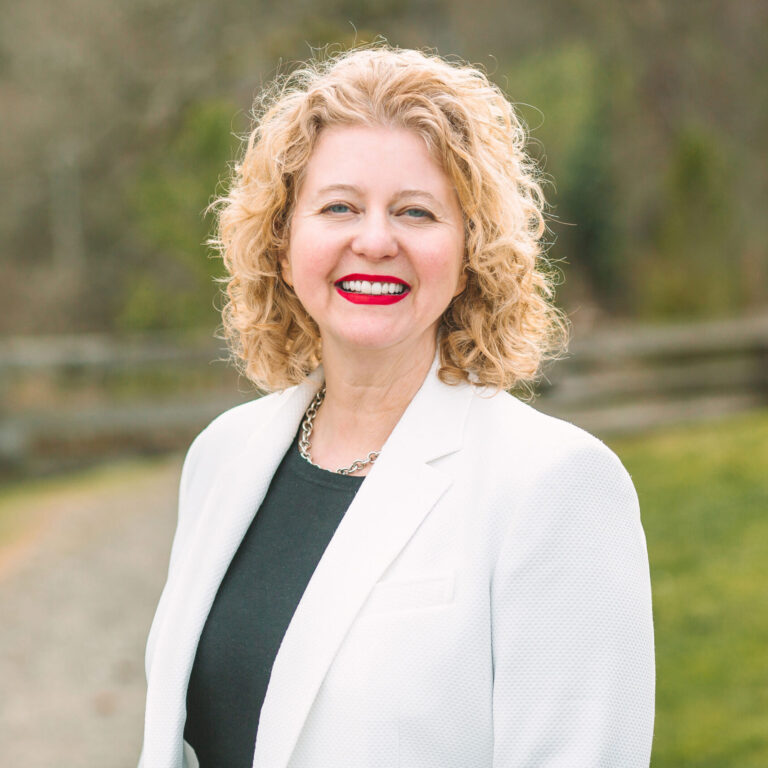Practical support, tools and strategies
Defining a smoother path for everyone
Creating a peaceful, dignified divorce
Children’s Rights After Divorce - The Bill of Rights of Children
- Home
- Divorcing with children
- Children's Bill of Rights
Parents sometimes unwittingly trample over their children’s rights after divorce. As part of my work as a child and divorce custody lawyer over the years, I am often asked the question if people are happier after divorce, and, in particular, I am asked about the effects of divorce on children. Kids will get through your separation and divorce process if you let them. What I mean is that you have to be diligent about not exposing your child to ongoing conflict.
Although it is wonderful if two emotionally mature parents skillfully put their kids’ needs first, it takes at least one sane and emotionally mature parent to raise a kid with a chance of success in this world. If it is not the other parent, it has to be you.
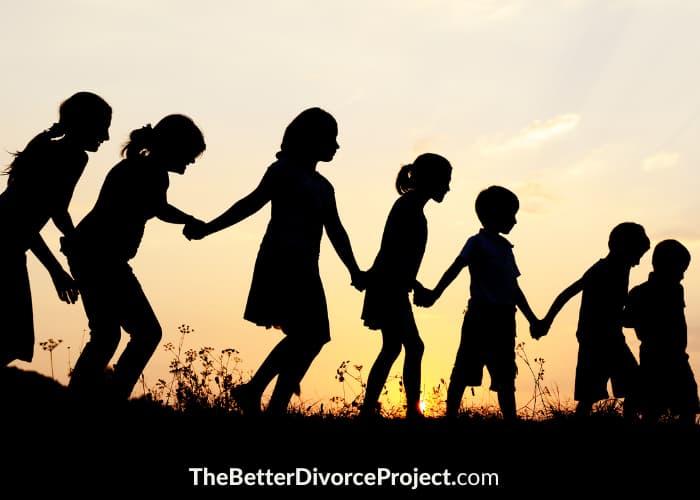
The thing is that co-parenting after divorce is often tremendously
challenging. Even parents who have fought hard for custody of their
children can make some big mistakes. You want your kids to be
well-adjusted, successful, happy adults, even if you are separated and
divorced right? In a nutshell, you want your kids to be healthy children
of divorce. In almost all cases, you must maintain a relationship with
your child's other parent. This is even if they are high-conflict types.
Even if you have gone through high-conflict divorce and separation, this Bill of Rights of Children can provide a great guide to keeping your children’s rights at the forefront despite your divorce.
No matter how much you can’t stand the idea of being in a continued relationship with the other parent, you must suck it up. You want the effect of your divorce on your children to be a positive one. Because of that, your co-parenting after divorce relationship has to ensure that your children are not sucked up in turmoil, stress, pain and hurt feelings between you and your ex.
Ongoing conflict with the
other parent is one of the worst things you can do to your child.
Research has shown that ongoing conflict affects the development of your
kids’ brains and damages your children so deeply that it can affect
their future relationships, whether or not they finish school, and
whether or not they battle with addiction. We can’t emphasize enough how
important it is to avoid ongoing conflict and get on with the
relationship you must have with the other parent to benefit your kids.
Even if your ex is a complete jerk, even if they are wrong and you are right, and even if they are the absolute worst, for the benefit of your kids, be the better person. Regardless of your circumstances, the universe requires you to be the bigger, better, more evolved parent. Your kids depend on it.
Your kids deserve better than dealing with emotional immaturity from both their parents.
We
find that most parents want to ensure that their children’s rights
after divorce are honoured and protected. They want to do what is best.
At the same time, they are sometimes unsure what doing their best and
doing the right thing is. The below Bill of Rights of Children is
self-explanatory and gives you powerful parenting guidelines to help.
Lois
V. Nightingale created it. Nightingale puts children’s rights after
divorce as first and foremost in her practice as a clinical
psychologist, marriage, family and child counsellor.
Nightingale
has written the Bill of Rights of Children in order to assist families
in understanding how the conflict between parents can affect children
after the separation. The Bill of Rights of Children assists parents in
returning the focus of parenting back to the children and in seeing
potential conflict from the child’s perspective. We have amended it
here and there and added to it based on many cases we have seen over the
years. It is reprinted with her generous permission.
We
encourage parents to have a copy of this document in their homes, read
it thoroughly, display it, and live by its guidelines as a parent. The
list is self-explanatory.
The best thing you can do is have an amicable separation and divorce if you have a child.
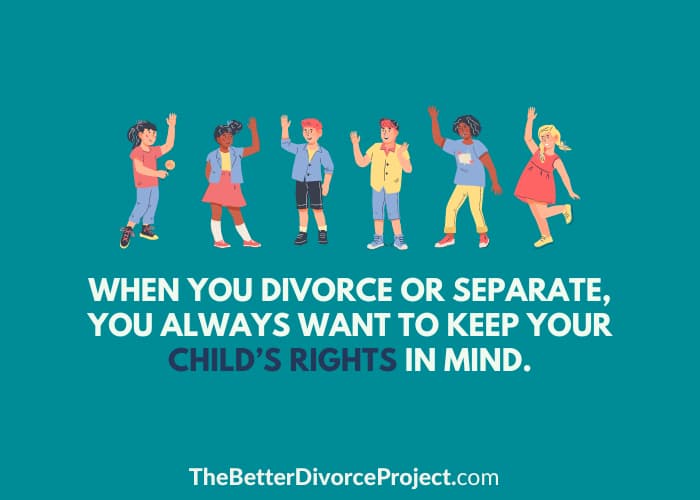
BILL OF RIGHTS OF CHILDREN
~By Lois V. Nightingale, Ph.D.~
Children’s Right After Divorce #1 - They Get to Continue to Love both parents.
They get to do so without guilt or disapproval (subtle or overt) by either parent or other relatives.
Sometimes parents do not even realize it they are doing it. Sometimes they do. I recall a case where the mother would sob uncontrollably whenever the father picked the children up to spend time with him. Most often the kids felt so bad for her, that they would not leave her and cancel time with their Dad. The kids were 8 and 10 years old. A horrible thing to put your kids through.
Children’s Right After Divorce #2 - They Get to Talk about their experiences with either parent or extended family and friends.
They also should get to do so without without subtle or overt disapproval.
Human beings are story tellers. We connect with and bond with others by sharing our experiences. It is unfair for a kid to not be able to share experiences they have had with their other parent or extended family. All too often kids learn that there is a stark divide between their two parents and their households and that they cannot share what happens in either.
Children’s Right After Divorce #3 - Kids Should Be repeatedly reassured that the divorce is not their fault.
It is amazing, but when divorce and separation occurs, kids think it is their fault. As parents, that is the furthest from our minds. But for kids, they think it was something they did.
My husband and I had our first separation when our daughter was eight (we supposedly reconciled but then separated a number of years later). As I write this, she is in her late teens. I asked her about when her Dad and I first separated if she thought it was her fault. She said, “well, yes!” as if I should have known that all along. I regret that I was so caught up in my own pain that I did not realize that I had to reassure her that our separation had nothing to do with it being her fault.
Children’s Right After Divorce #4 - They should See their parents working together for their benefit.
Rearranging the schedule because grandparents are in town, for example, is one-way kids should see their parents working together. Although grandparents' rights in divorce are not the same as parents and guardians, your child is entitled to see their extended family and you working with the other parent to make that happen.
When kids see their parents fighting about issues they think it is their fault. When they see their parents working together, they feel loved and secure and that they matter. Healthy children of divorce see their parents working together for their benefit.
Children’s Right After Divorce #5 - Be reassured they are Safe and their needs will be provided for.
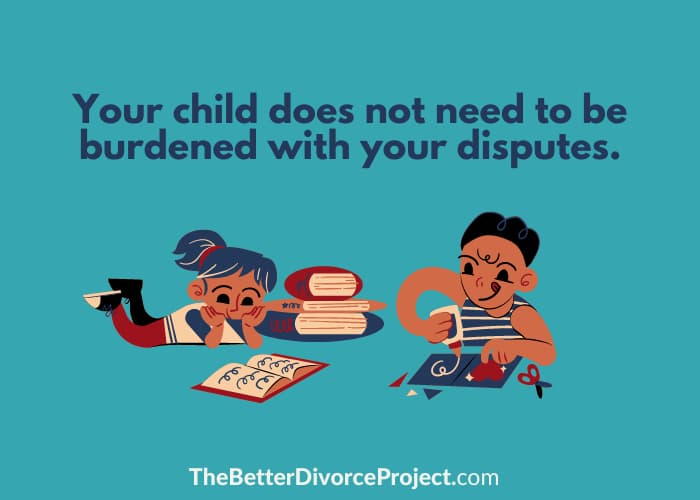
Obvious right? It is a children’s right that they should not be burdened with adult concerns about money and other issues. Whether it is child support or spousal support, your child does not need to be burdened with your disputes.
Children’s Right After Divorce #6 - They should have a special place for their own belongings at both parents’ residences.
In one case, the parents had a court-ordered week-on and week-off parenting schedule. The father made the children change out of their clothes from “his” house, empty out their lunch kids from “his” house, and leave all other belongings from “his” house with him when returning to their moms. This was a process they had to go through on a weekly basis.
What kind of lesson is he teaching his kids? What kind of relationships is teaching them to have with this kind of behaviour? I wonder what the effect of the parents’ divorce will have on these children?
Children’s Right After Divorce #7 - Visit both parents regardless of what the adults in the situation feel and regardless of convenience or money situations.
As I have stated elsewhere, I have only ever had two cases in over 25 years of practising law where a parent was cut off from seeing their child entirely. In both of those cases, the circumstances were severe. It takes a lot for kids to have no relationship with their other parent.
Children’s Right After Divorce #8 - Kids should be able to Express anger and sadness in their own way.
Every child is different, however, they will likely have some big feelings and should be able to express them according to their age and personality. When helping your children cope with your divorce or separation, they should not have to justify their feelings or cope with trying to be talked out of their feelings by adults).
The best book I have encountered regarding allowing kids to have their feelings is How to Talk so Kids Will Listen & Listen so Kids Will Talk, by Adele Faber and Elaine Mazlish. Let your kids feel their feelings. It will deepen your relationship and keep you connected to them when you allow this to happen.
Children’s Right After Divorce #9 - have the right not to be the messengers between their parents.
This means that kids should not have to carry notes, cheques, legal papers, money or requests between parents.
Children’s Right After Divorce #10 - children should not have to make adult decisions, including where they will live, where and when they will be picked up or dropped off, or who is to blame for their parents getting divorced.
In my jurisdiction, kids are consulted about the parenting plan and what they would like to see, however, a lot of times this is taken way too far. I had a case where a five-year-old told an assessor “I want a 2/2/3 schedule.” They were obviously exposed to inappropriate adult conversation and pressure from an adult regarding the parenting schedule. It puts unfair pressure on your kid to do this. Don’t make them responsible for what you want.
Children’s Right After Divorce #11 - Kids should get to Love as many people as they choose without any pressure (overt or otherwise) placed on them to feel guilty or disloyal.
Loving and being loved by many people is good for children; there is no limit on the number of people a child can love. I had a case where a 9-year-old girl was told that she was not allowed to mention anything about her Mom while with her Dad. She was told that when she was having time with her Dad, "When you are at my house your Mom does not exist.”
Helping your children cope with divorce includes allowing them to love all of their family members.
Children’s Right After Divorce #12 - Kids should get to continue to be kids, i.e. not take on adult duties and responsibilities or become a parent’s special confidant, companion or comforter.
I am thinking of one case where an 11-year-old boy scolded his Dad for flaunting his relationship with his new girlfriend on Facebook. How many 11-year-olds do you know hanging out on Facebook? The child had been exposed to his mother being angry about his father’s activities. This is not fair to the child. Obviously, this child loves his Mom and sees her hurt, but the fact he felt obliged to tell his Dad off demonstrates that he had been exposed to his Mom’s narrative. Putting your child in the middle of your dispute is unfair and damaging to them.
Let your kids be kids and not be your comforter.
Children’s Right After Divorce #13 - Kids should be able to stay in contact with relatives, including grandparents and special family friends.
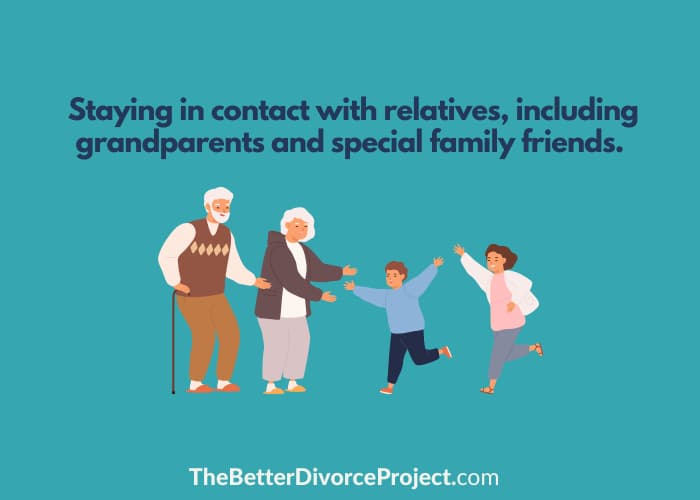
Just because you are divorcing the other parent does not mean the children have to divorce their extended family.
Children’s Right After Divorce #14 - Kids should be able to spend at least one week a year living apart from their custodial parent.
Although most parents share their children's time on a relatively equal basis, it is good for kids to be able to spend time with a parent uninterrupted. This is particularly the case if one parent lives some distance away and they do not get to spend much time with that parent.
Children’s Right After Divorce #15 - Children should Not be on a long car ride, an airplane, train or bus on major holidays for the convenience of adults.
I remember when I first got together with the person I eventually married. Every year he would travel back from his sister’s home on Christmas day. It meant that his eight-year-old daughter spent every Christmas day in transit for about five hours, most of the day. This is because each of her parents wanted to see her on Christmas day.
This arrangement had the interest and benefit of the parents, not the child. When I became involved, I suggested (and they agreed) to an alternating Christmas schedule so she could enjoy her Christmas days rather than spending most of Christmas day being in transit.
Children’s Right After Divorce #16 - Your Kids’ teachers and schools should be informed about the new status of their family.
Teachers and other caregivers should know what is happening regarding the transition. It will help them understand and provide context if your child is struggling in the classroom.
Children’s Right After Divorce #17 - Your Kids should get to Have time with each parent doing activities that create a sense of closeness and special memories.
Almost always, it is important that children have an ongoing and meaningful relationship with each of their parents. After I separated from my daughter’s father, she lived primarily with me but always saw her Dad on weekends. Unlike myself, my daughter and her Dad are both great artists and they developed a routine where they would spend each Sunday afternoon together painting and drawing.
Although there were times when I was feeling angry with him still, I always maintained the respect and encouragement that she would have this time with her Dad. It has made her a better person and better young adult than she would have been. Just because her dad and I were getting divorced, it did not mean that she would not have continued special times with her Dad doing activities that created closeness and special memories for each of them.
Children’s Right After Divorce #18 - Kids should have a predictable daily and weekly routine that can be verified by looking at a schedule.
This should be on a calendar in a system understandable to the child. For instance, for little kids, a green line represents the scheduled time with dad, a purple line represents the scheduled time with mom, etc. and so on.
It is important that kids know where they will be. They are entitled to predictability.
Children’s Right After Divorce #19 - Kids should get to participate in sports, special classes or clubs that support their unique interests, and have adults that will get them to these events.
This should be done without guilt or shame regardless of which parent is parenting the child at that time and which parent signed the child up for the activity.
It is heartbreaking to see how often I have seen a parent not take their child to an extracurricular activity because it was something the other parent signed them up for. In one particular instance, the child (who had significant disabilities), I will call her Emily, lost out on the opportunity to do training with horses in a special program that would have benefited her greatly. Her father refused to sign the consent forms because the mother had found this great resource. Rather than let Emily participate in this fully funded (free to the parents) program for her benefit, he refused to consent, so another child took Emily’s place.
Children’s Right After Divorce #20 - Kids should be able to contact the absent parent and have phone or video conversations without the other parent eavesdropping, being questioned or recording it.
Sometimes kids want to reach out to their other parent, just to hear their voice and be reassured. When the other parent eavesdrops, refuses to allow the child access to a phone, records the call, or refuses privacy it sends a terrible message to the child. It shows the child that they are not entitled to their own agency or privacy.
Children’s Right After Divorce #21 - Kids should be able to ask questions and have them answered respectfully with age-appropriate answers.
Those answers should not include the blaming or belittlement of anyone.
Kids will ask questions. They should be allowed to ask them and be curious.
Children’s Right After Divorce #22 - Be exposed to both parents’ hobbies, interests, tastes in food, or religion:
I had a high-conflict case where the mother was vegetarian (and fed the parties’ son that way and was always careful about nutrition). The father was vegan and felt strongly about being vegan. He was critical of the mother for being a “sell-out” because she still ate dairy products and eggs from time to time. The father would ask the child what food the mother fed him and then insult the mother's food choices. The child started scolding and berating the mother for feeding him non-vegan food. While the child was only 10 years old, these parents had not been together for more than six years, yet the child was well aware of and embroiled in his father’s hostile narrative towards the mother. The mother was the primary parent, and it caused the child no end of confusion and stress.
Despite the parents not being together for years, the father was determined to hang on to the high conflict custody battle he had started. He was not prepared to let it go and this impacted the child a lot and very negatively.
Children’s Right After Divorce #23 - Kids should get to have consistent and predictable boundaries in each home.
When considering the effects of divorce on children, people often think that each house has to have the same routine. Routines do not have to be the same in both homes, but consistency within each home is helpful. Although the rules in each house may differ significantly, each parent’s rules need to be predictable within their own household.
Children’s Right After Divorce #24 - Kids should Be protected from hearing adult arguments and disputes.
Obvious. I would go so far as to say that even if you don’t argue in front of the child, children are more emotionally intelligent than we are and can feel when their parents are in constant disputes. Even if you have gone through a high-conflict divorce, let it go whenever possible. Even if you are divorcing a narcissist, for example, there are strategies you can use to keep your child out of the effects of the high conflict divorce. Learn those strategies.
Children’s Right After Divorce #25 - Kids should have parents that communicate (even if only in writing) about their medical treatment, psychological treatment, educational issues, accidents and illnesses.
Kids need their parents to know when something significant has happened or when they are engaged in treatment.
Children’s Right After Divorce #26 - Kids should not be interrogated upon return from the other parent’s home or asked to spy in the other parent’s home.
You would think it would be obvious. Sometimes parents go so far as to interrogate their kids, other times they don’t even realize they are dragging their kids into the conflict they have with the other parent.
I know of one case where the seven-year-old child knew his Dad would be thrilled to hear of anything that was not going well in his Mom’s home. The child knew he could get extra attention from his Dad when he reported such things as being allowed to sit in the car's front seat or that he was not buckled in well enough to his booster seat. These are the kinds of things kids should not have to worry about.
Children’s Right After Divorce #27 - Own pictures of both parents and display them in each of their homes.
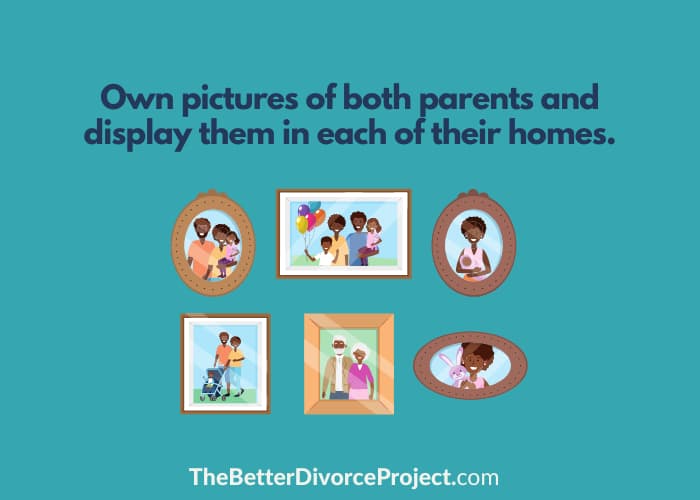
I recall a case where the father, who hated the mother, refused to allow the children to have any photos of her in his house. The mother was not much better. She claimed that she did not have photos of the father in her house because her walls did not allow photos to hang up. After all, they were concrete walls she said. I showed the court the photos and pieces of art she had all over the house demonstrating she was not being truthful. What will the effects of the divorce be for these kids?
Children’s Right After Divorce #28 - Kids should get to choose to talk with a special adult about their concerns and issues (counsellor, therapist or special friend) while their confidentiality stays maintained.
Kids need someone to talk to without getting sucked into their parents’ disputes. I had one case where the father refused to allow the child to continue their relationship with their counsellor even though the child had become close to the counsellor and was getting great benefit. The issue for the Dad was that the counsellor seemed to be more “on side” with the mother.
Children’s Right After Divorce #29 - Kids should have parents who have worked through or are taking responsibility for their own pain.
When parents have unresolved pain, and this pain relates to the other parent, they need to get out of the narrative that it is all the other parent’s fault and take responsibility for their healing and moving forward.
As a parent you can do this by obtaining therapy, using the simple forgiveness meditation technique of Hoʻoponopono, or any other method to see your pain worked through responsibly without having it burden your kids.
Children’s Right After Divorce #30 - Having parents be aware that the cost of conflict to children is profound, even if that conflict does not happen “in front of” children.
Children feel tension and stress when missile texts and emails fly back and forth, for example, even if they are not reading them.
The worst thing you can do for your children is to be involved in the ongoing conflict. It hurts them. Be the better person even if you have gone through a high-conflict divorce. Your kids deserve it.
When you divorce or separate, you always want to keep your child’s rights in mind.
